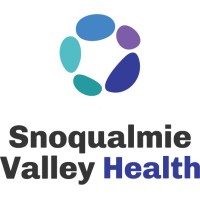Snoqualmie Valley Assault Treatment Services (SVATS)

Grantee: Snoqualmie Valley Health
Timeframe: October 2024 – September 2025 | Amount: $24,540.87
Snoqualmie Valley Health is establishing a new forensic medicine and sexual assault treatment center to support underserved populations in rural east King County. This grant will fund needed equipment and supplies to help get the program started.
SVH is committed to establishing a new service, Snoqualmie Valley Assault Treatment Services (SVATS), aimed at providing direct forensic and medical examinations to victims of sexual assault, intimate partner violence, and nonfatal strangulation within the proposed service area. The program will also offer follow-up medical services, mental healthcare referrals and treatment, and community education. This initiative will be supported through direct service provision and strong community partnerships with law enforcement, legal services, victim services, mental healthcare resources, and other necessary entities.
SVATS will be primarily staffed by current SVH medical staff member Katherine Thompson, PA, and Dr. Tammy Moore, both trained forensic examiners. Ms. Thompson brings over a decade of experience in interpersonal violence, including direct forensic services, leading embedded forensic healthcare programs, and conducting research in intimate partner violence, sexual violence, nonfatal strangulation, and human trafficking. Given the critical nature of this service, SVH is dedicating 0.1 FTE of Ms. Thompson’s time as an in-kind contribution to the SVATS project. Dr. Moore and Ms. Thompson will be on-call 24/7 to conduct sexual assault examinations as needed. Ms. Thompson will also provide training and guidance to other staff seeking certification as forensic examiners.
Establishing the SVATS program is expected to improve access and reduce disparities by delivering essential services to residents of eastern King County. With this program in place, individuals who have experienced sexual assault, intimate partner violence, or other interpersonal traumas will be able to quickly receive appropriate and empathetic support. While there is a significant need for this program, estimating the number of individuals who may seek services at SVH is challenging. Currently, no data specifically tracks sexual assault cases from eastern King County, as individuals often must travel to other programs that do not monitor the residential locations of treatment recipients. Furthermore, national data indicates that many cases of sexual assault go unreported, suggesting that current county-wide data likely underrepresents the true level of need. Based on population size and estimated rates of sexual assault, the program anticipates serving 25 to 30 individuals each year. Data collected in the first year will help assess whether adjustments to the program’s scale are necessary.
The ultimate vision for SVATS includes the creation and maintenance of robust community resources for multidisciplinary activities. The hospital aims to become a hub for these activities, such as comprehensive strangulation questionnaires for police and fire, high-risk domestic violence teams in collaboration with local law enforcement, support groups, teen healthy relationship classes, a child advocacy center for child abuse and sexual abuse, and various community education initiatives designed to foster a stronger, violence-free community. Funding from this grant will support the initial resources needed to provide forensic and medical examinations, marking the first step toward this broader vision.
While SVH has committed some personnel time to this work, the organization is seeking a small grant for equipment and supplies to launch the program. Funds will be used to purchase an exam table, a high-definition camera with a macro lens for documentation during exams, sexual assault kits for evidence collection, pharmaceuticals for patient care, and other necessary clinical supplies. The acquisition of these supplies and equipment is scheduled to begin in October 2024, with hopes to receive them by December 2024. During this time, Ms. Thompson will provide trauma-informed training to all SVH staff. By November, the team will start developing essential policies and procedures, collaborating with community partners to establish referral processes and build strong local partnerships. Training for staff on these policies and referral processes is set for November and December 2024. Additionally, outreach will commence to inform law enforcement agencies, community partners, and the public about the upcoming service, aiming to start accepting patients in January 2025.
SVH is governed by an elected Board of local community members who oversee the strategic plan and budget, ensuring that all programs respond effectively to community needs. The organization actively seeks input and feedback from community members utilizing its services to inform program revisions and enhancements. Every three years, a comprehensive Community Health Needs Assessment (CHNA) is conducted, reviewing data on key health issues affecting the served populations, gathering feedback from stakeholders, and identifying the community’s most pressing health priorities.
In the 2022 CHNA, 29% of respondents indicated that physical access to healthcare, including transportation and a lack of facilities in the region, was their primary concern. This finding underscores the necessity for new services to be delivered locally, within easy reach of residents.
As SVH progresses with the development of SVATS, it will engage with key regional partners, including victim services, legal services, and law enforcement, to solicit input on program design and develop referral resources and processes. Collaboration with victim services will help ensure that the SVATS program is welcoming and supportive for all victims of sexual assault and domestic violence. SVH is well-positioned to monitor the utilization and outcomes of the new program, employing tools such as patient surveys to collect feedback and suggestions. A successful program is anticipated to grow and evolve as more individuals utilize it and trust the care provided, prompting close evaluation of visit statistics, patient demographics, and other necessary metrics to track progress and growth.
ABOUT OUR GRANTEE
“Since 1983, Snoqualmie Valley Health has been serving the communities of Snoqualmie, North Bend, Carnation, Preston, Fall City and the surrounding areas as far east as Snoqualmie Summit. SVH is a public hospital district, dedicated to serving the needs of the community.
Our role as a rural community hospital is immeasurable. Access to quality healthcare is critical and Snoqualmie Valley Health provides healthcare services for those we work and live with – our neighbors and friends.”